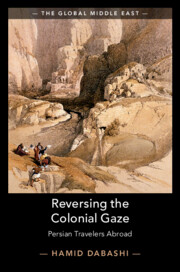Book contents
- Reversing the Colonial Gaze
- The Global Middle East
- Reversing the Colonial Gaze
- Copyright page
- Dedication
- Contents
- Figures
- Preface
- Acknowledgments
- Introduction
- 1 Mr. Shushtari Travels to India
- 2 Mirza Abu Taleb Travels from India
- 3 An Ilchi Wonders about the World
- 4 A Colonial Officer Is Turned Upside-Down
- 5 A Shirazi Shares His Travelogues
- 6 A Wandering Monarch
- 7 Hajj Sayyah Leads a Peripatetic Life
- 8 In the Company of a Refined Prince
- 9 A Wandering Mystic
- 10 In and out of a Homeland
- 11 The Fact and Fiction of a Homeland
- 12 Professor Sayyah Comes Home to Teach
- Conclusion
- Index
7 - Hajj Sayyah Leads a Peripatetic Life
Published online by Cambridge University Press: 19 December 2019
- Reversing the Colonial Gaze
- The Global Middle East
- Reversing the Colonial Gaze
- Copyright page
- Dedication
- Contents
- Figures
- Preface
- Acknowledgments
- Introduction
- 1 Mr. Shushtari Travels to India
- 2 Mirza Abu Taleb Travels from India
- 3 An Ilchi Wonders about the World
- 4 A Colonial Officer Is Turned Upside-Down
- 5 A Shirazi Shares His Travelogues
- 6 A Wandering Monarch
- 7 Hajj Sayyah Leads a Peripatetic Life
- 8 In the Company of a Refined Prince
- 9 A Wandering Mystic
- 10 In and out of a Homeland
- 11 The Fact and Fiction of a Homeland
- 12 Professor Sayyah Comes Home to Teach
- Conclusion
- Index
Summary
In Chapter 7, “Hajj Sayyah Leads a Peripatetic Life,” I dwell on Hajj Muhammad Ali Sayyah’s Khaterat/Memoirs (1878). In his early twenties, Hajj Muhammad Ali Sayyah embarked upon a journey around the globe that would last almost two decades and take him from Iran to Central Asia, Europe, and finally to the United States, where he lives for about a decade, becomes a US citizen, and meets with President Ulysses S. Grant. What is peculiar about Hajj Sayyah’s travels is that they are decidedly global in their expanse and therefore their active formation of a non-unitary “nomadic subject.” He was about to marry his cousin and be forced into a domestic life when he decided to run away and see the world for himself. He in fact fakes his own death while still traveling in Iran, in a gesture of supreme symbolic significance, before he embarks upon his peripatetic life around the planet. He returns to his homeland a harbinger of what at the time was not even recognized as economic and cultural globalization, yet fully to be grasped and theorized decades later in the future in the age of global and differentiated mobility, when a diffuse form of nomadism will rise to define the location of multiple, integrated, and cosmopolitan subjects.
Keywords
- Type
- Chapter
- Information
- Reversing the Colonial GazePersian Travelers Abroad, pp. 185 - 221Publisher: Cambridge University PressPrint publication year: 2020

